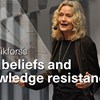beliefs
Explaining the reliability of moral beliefs
p.:37-57 in: Ethics and Explanation (eds. W. Leibowitz and N. Sinclair), Oxford: Oxford University Press. More information about the book Ethics and Explanation

Åsa Wikforss: Bad Beliefs and Knowledge Resistance
Research seminar with Åsa Wikforss, professor of theoretical philosophy at Stockholm University and member of the Swedish Academy. Her research involves topics such as the philosophy of language, the
Åsa Wikforss: Bad Beliefs and Knowledge Resistance
Venue: Institute for Futures Studies, Holländargatan 13 in Stockholm, or online. Research seminar with Åsa Wikforss, professor of theoretical philosophy at Stockholm University and member of the Swedish
On the Methodological Difficulty of Identifying Implicit Racial Beliefs and Stereotypes
American Sociological Review 85(6):1117-1122. In “Status Characteristics, Implicit Bias, and the Production of Racial Inequality,” Melamed, Munn, Barry, Montgomery, and Okuwobi present an innovative an
Divided by Memories? Beliefs about the Past, Ethnic Boundaries, and Trust in Northern Iraq.
Geopolitics, History, and International Relations 9(1), pp. 128-175. Abstract This paper examines beliefs about the past across ethnic groups in con- flict ridden Northern Iraq, and the extent to which s
Never eat a Pigeon with a Pumpkin: a model for the emergence and fixation of unsupported beliefs
This work was presented at the Oxford Symposium on Food and Cookery 2023, and a shortened form of the paper is Chapter 30 in Food Rules and Rituals: Proceedings of the Oxford Symposium on Food and Coo
Joakim Kulin: Climate change or social change? Sociological perspectives on citizens’ environmental beliefs, attitudes, and behaviors
Joakim Kulin, Researcher at Department of Sociology, Umeå University.ABSTRACT It is increasingly evident that greenhouse gas emissions and global warming pose serious existential risks to human societi
Belief Revision for Growing Awareness
Mind 130(520), 2021 Abstract The Bayesian maxim for rational learning could be described asconservative changefrom one probabilistic belief orcredencefunction to another in response to new information. ). But can this conservative-change maxim be extended to revising one’s credences in response to entertaining propositions or concepts of which one was previously unaware? The economists,) make a proposal in this spirit. Philosophers have adopted effectively the same rule: revision in response to growing awareness should not affect the relative probabilities of propositions in one’s ‘old’ epistemic state. The rule is compelling, but only under the assumptions that its advocates introduce. It is not a general requirement of rationality, or so we argue. We provide informal counterexamples. And we show that, when awareness grows, the boundary between one’s ‘old’ and ‘new’ epistemic commitments is blurred. Accordingly, there is no general notion of conservative change in this setting.
Expert deference as a belief revision schema
in Synthese (2020) AbstractWhen an agent learns of an expert’s credence in a proposition about which they are an expert, the agent should defer to the expert and adopt that credence as their own. This

Implicit Mind: Belief, Alief and Experience with Kathrin Glüer
Recording from the Implicit Mind Workshop at the Institute for Futures Studies in Stockholm, May 2015.








